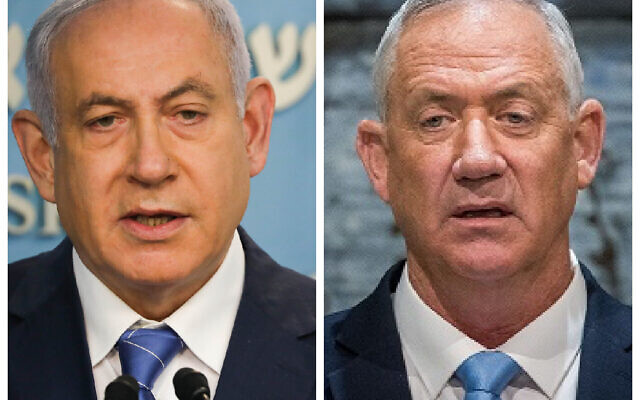Netanyahu and Gantz agree deal to form emergency government
Embattled PM will remain in place after signing last-minute agreement with opposition leader to avert a fourth election
Israeli politicians finally ended a year-long squabble on Monday evening by agreeing to form a government with Benjamin Netanyahu at its head for the first 18 months.
Opposition leader Benny Gantz agreed to enter into “an emergency national unity government” with the current prime minister, a man he had repeatedly pledged to oust, letting Netanyahu remain as PM until next autumn, assuming he is not convicted of corruption first.
In recent weeks former army chief Gantz has split his Blue and White party, claimed the title of Speaker in Israel’s parliament, the Knesset, and moved forward on plans to limit Israeli prime ministers to two terms. Such a law, which has strong support, would require Netanyahu to step down.
In recent days Gantz told Israeli President Reuven Rivlin that he was unable to form a government, but amid scenes of protest across the country and threats of forcing a fourth consecutive election on the Israeli public, the two sides finally agreed terms.
They said there will be 32 ministers, split 50:50 between Gantz and his faction on the one hand and Likud and its right-wing and strictly Orthodox allies on the other, with both sides holding a veto over important issues.
The coalition will also include the remnant of the Labor party and command a 12-seat majority in the 120-seat Knesset, with a large Arab bloc sitting in opposition.
Under the terms, Gantz and his deputy Gabi Ashkenazi will become defence and foreign minister respectively, with Gantz taking over as prime minister in 18 months or earlier if Netanyahu is convicted of bribery. Crucially, Blue and White won control of the justice ministry, ahead of Netanyahu’s trial.
At the top of Netanyahu’s agenda is the plan to annex large parts of the West Bank, scheduled for July this year.
Gantz has not stood in the way of US-inspired proposals to exert Israeli sovereignty over land many say is Palestinian. Mohammad Shtayyeh, the Palestinian prime minister, called the coalition “an Israeli annexation government”.
Pressure to strike a deal had been growing after protests against the government’s perceived inaction in the face of a severe economic downturn, but critics accuse Gantz of backing down.
Former BICOM chief executive James Sorene said he “played a weak hand badly then folded,” but Gantz defended himself, saying that a refusal to compromise would mean “dragging Israel to elections at a time of emergency”.
He added: “This is the time for leaders to choose what is right and put the lingering issues and personal scores aside.”
Yohanan Plesner of the Israel Democracy Institute said the mutual veto “will in effect paralyse the future government’s ability to formulate policy” and was “likely to prevent the possibility of anti-democratic legislation”.
He said: “This agreement does not initiate any policies, introduce proposals for reform, or present new plans for extracting Israel from the current crisis.
“Instead, it paves the path towards a government without a grand vision or clear goals that will be burdened with numerous wasteful ministries and cumbersome political agreements based upon distorted legislative constructs.”

Thank you for helping to make Jewish News the leading source of news and opinion for the UK Jewish community. Today we're asking for your invaluable help to continue putting our community first in everything we do.
For as little as £5 a month you can help sustain the vital work we do in celebrating and standing up for Jewish life in Britain.
Jewish News holds our community together and keeps us connected. Like a synagogue, it’s where people turn to feel part of something bigger. It also proudly shows the rest of Britain the vibrancy and rich culture of modern Jewish life.
You can make a quick and easy one-off or monthly contribution of £5, £10, £20 or any other sum you’re comfortable with.
100% of your donation will help us continue celebrating our community, in all its dynamic diversity...
Engaging
Being a community platform means so much more than producing a newspaper and website. One of our proudest roles is media partnering with our invaluable charities to amplify the outstanding work they do to help us all.
Celebrating
There’s no shortage of oys in the world but Jewish News takes every opportunity to celebrate the joys too, through projects like Night of Heroes, 40 Under 40 and other compelling countdowns that make the community kvell with pride.
Pioneering
In the first collaboration between media outlets from different faiths, Jewish News worked with British Muslim TV and Church Times to produce a list of young activists leading the way on interfaith understanding.
Campaigning
Royal Mail issued a stamp honouring Holocaust hero Sir Nicholas Winton after a Jewish News campaign attracted more than 100,000 backers. Jewish Newsalso produces special editions of the paper highlighting pressing issues including mental health and Holocaust remembrance.
Easy access
In an age when news is readily accessible, Jewish News provides high-quality content free online and offline, removing any financial barriers to connecting people.
Voice of our community to wider society
The Jewish News team regularly appears on TV, radio and on the pages of the national press to comment on stories about the Jewish community. Easy access to the paper on the streets of London also means Jewish News provides an invaluable window into the community for the country at large.
We hope you agree all this is worth preserving.






















